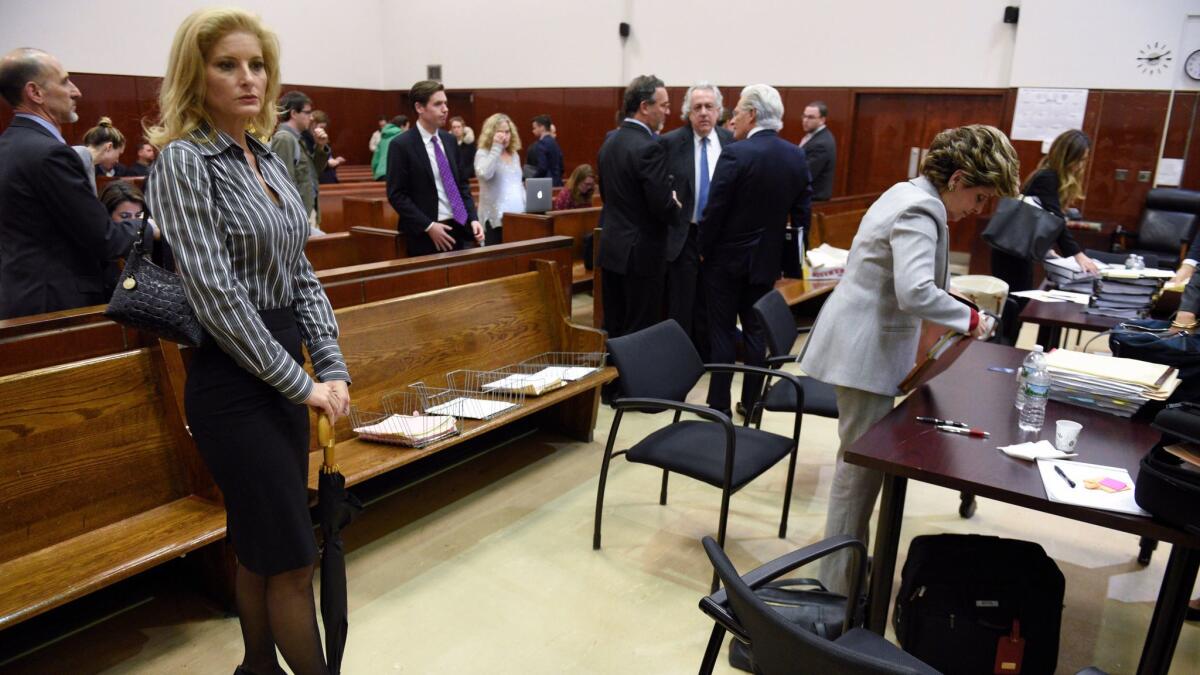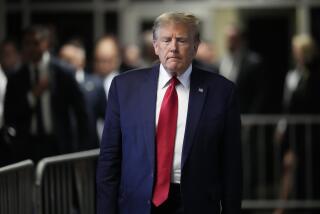Trump lawyer presses argument for presidential immunity in defamation case

- Share via
Reporting from New York — An attorney for President Trump asked a New York state judge Tuesday to set aside a suit brought by a woman who claims Trump groped her a decade ago, saying that a trial in state court would improperly interfere with his duties as chief executive.
Judge Jennifer Schecter heard arguments from Trump’s lawyer, Marc Kasowitz, and Mariann Wang, an attorney for Summer Zervos, a former contestant on Trump’s reality TV show “The Apprentice” who has alleged that Trump kissed her and touched her inappropriately during meetings in 2007 at Trump Tower and at the Beverly Hills Hotel.
In her lawsuit, Zervos claims Trump defamed her last year when he labeled her and other women who accused him of sexual misconduct as liars.
Kasowitz argued that Trump’s comments were protected by the 1st Amendment and that a state court doesn’t have the authority to hear the case during his presidency. Wang said the defamatory comments were not protected and a state court does have such authority.
Zervos can’t sue Trump for sexual harassment because the time limit for such a case has expired. Pursuing the defamation case, however, could lead to airing of the underlying sexual harassment allegations.
The suit could also jeopardize Trump in the way that a similar case by Paula Jones jeopardized then-President Clinton — by forcing him to answer questions under oath. Clinton’s false statements in Jones’ case provided the basis for the impeachment charges that were brought against him in 1998.
Being required to testify under oath could be particularly dangerous for Trump, given his history of saying things that are untrue, said Naomi Mezey, a Georgetown University law professor.
“For those people who are interested in this case as a path to impeachment, the chances of perjury in a Trump case are possibly greater than in a Clinton case,” Mezey said. “Testifying in a lawsuit takes a huge amount of discipline. If there’s one characteristic that seems absent from the Trump personality, it’s verbal discipline.”
Zervos first spoke publicly about her contacts with Trump in October 2016, after an “Access Hollywood” videotape surfaced in which Trump spoke about being able to grab women by the genitals.
Trump vigorously denied the accusations by Zervos and other women, repeatedly describing them as “fabrication” and “made-up stories and lies,” at one point threatening to sue the women.
In a complaint filed in January, attorneys Gloria Allred and Wang said that Trump “used his national and international bully pulpit to make false factual statements to denigrate and verbally attack Ms. Zervos and the other women who publicly reported his sexual assaults,” causing “serious harm” to her reputation, honor and dignity. In addition to damages, the lawsuit seeks a retraction and apology by Trump.
In briefs and before the court on Tuesday, Kasowitz argued that the case should be dismissed or at least stayed until Trump leaves office. The then-presidential candidate’s statements were political speech and statements of opinion protected by the 1st Amendment, he argued.
In a twist of history, Kasowitz has invoked the same legal argument that attorneys for Clinton did 20 years ago, when he was accused of sexual harassment by Jones — that a sitting president is immune from lawsuits regarding his conduct before he took office.
In 1997, the Supreme Court ruled unanimously that the chief executive is not shielded from responding to a civil suit regarding his private behavior. Trump’s lawyer argued that ruling should only apply to suits in federal court, not state courts.
The Constitution makes clear that “federal law and the execution of federal law, for which the president is uniquely and 24/7 responsible, takes precedence over state law,” Kasowitz said.
Wang said Kasowitz was making some “creative arguments.”
“There is no case that says a federal official cannot be called to account in a state court,” she said.
Three law professors who submitted friend-of-the-court briefs 20 years ago in the Clinton case and now in the Trump case have argued the same.
“No one in our nation is above the law, not even our President,” Stephen Burbank of the University of Pennsylvania, Richard Parker of Harvard and Lucas Power of the University of Texas wrote in the brief filed earlier this year.
Nothing in the Constitution “immunizes a sitting President from claims brought in state court based on allegations of unofficial conduct,” they wrote.
Schecter did not issue a ruling, but did ask Zervos’ attorneys whether staying the case would be detrimental and if they would be “flexible” in accommodating the president’s schedule were a trial to go forward.
Mezey, who teaches civil procedure and co-directs Georgetown’s Gender Justice Initiative, said she would be “stunned” if the judge found Trump to be immune.
“All of the arguments that they made in Clinton v. Jones seem abundantly applicable to state court, and all of the accommodations that would be made in federal court could be made in state court as well,” Mezey said.
Either way, the decision is likely to be appealed.
“The implications are potentially huge, especially for someone like President Trump who appears to have a long line of potential plaintiffs like this one waiting in the wings,” Mezey said.
Twitter: @AgrawalNina
More to Read
Sign up for Essential California
The most important California stories and recommendations in your inbox every morning.
You may occasionally receive promotional content from the Los Angeles Times.












